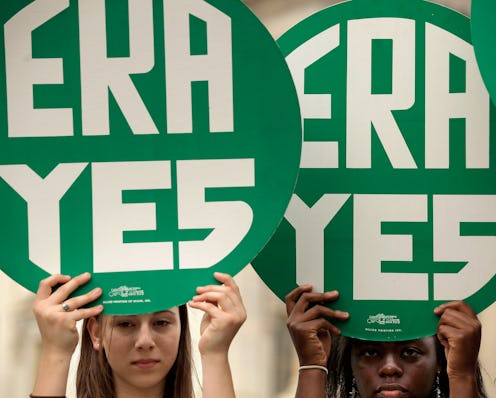
It's been 45 years since the Equal Rights Amendment was passed by the Senate and sent to the states for ratification. Unfortunately, not enough states ratified the Amendment and it didn't pass. Which means that, despite over 100 other countries having gender equality provisions in their Constitutions, the United States does not provide for gender equality in ours. And that's an effing disgrace.
Normally when we think of women and the Constitution, we think of the 19th Amendment — the Amendment that gave women the right to vote. And that was huge. Elizabeth Cady Stanton and Lucretia Mott had fought for women's suffrage in the mid-19th century and Susan B. Anthony and others continued that fight until it was ratified in 1920. But it's wrong to think that because of the 19th Amendment that women are fully protected in the constitution. It's just not enough — voting isn't everything.
Now, this is in no way to minimize the accomplishments of the 19th Amendment. It was frigging earth-shattering. Women, who so long had been denied this basic right, were suddenly allowed to participate in and influence this democratic process. And women today are all indebted to those women. But the Amendment is very, very narrow— which is why so many people supported (and support) the Equal Rights Amendment.
I mean, just take a look at the wording of the 19th Amendment:
"The right of citizens of the United States to vote shall not be denied or abridged by the United States or by any state on account of sex. Congress shall have power to enforce this article by appropriate legislation."
It's short, simple, effective — for what it was, an Amendment giving women the right to vote. But it says nothing else. And voting was not and is not the only discrimination that women have faced. That's where the Equal Right's Amendment came in — or where it tried to.
Here's the original wording the Amendment, when it was called the "Lucretia Mott Amendment":
"Men and women shall have equal rights throughout the United States and every place subject to its jurisdiction."
A lot more general, right? And, frankly, not asking for very damn much. Equal rights for men and women in America... how have some states still not ratified this?
The fact that women are not given thorough constitutional protection — like they are afforded in so many other countries — is shocking. That being said, there's recently been a push. And by recently, I mean like, yesterday.
Seriously, yesterday the Equal Rights Amendment was passed the Nevada Assembly. 35 years after the deadline, but still something.
There are arguments that the Constitution protects all citizens, that separate protection for women would be gratuitous and even patronizing. But those who are victims of discrimination should be adequately protected. And while the 19th Amendment was a huge step forward, it is by no means a source of comprehensive protection. The Equal Rights Amendment hoped to provide a what is currently not found in the Constitution. They may both be huge milestones, but the Equal Rights Amendment and 19th Amendment are very, very different.